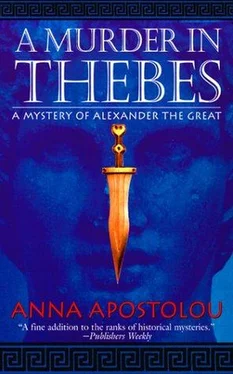Paul Doherty - A Murder in Thebes
Здесь есть возможность читать онлайн «Paul Doherty - A Murder in Thebes» весь текст электронной книги совершенно бесплатно (целиком полную версию без сокращений). В некоторых случаях можно слушать аудио, скачать через торрент в формате fb2 и присутствует краткое содержание. Год выпуска: 2013, ISBN: 2013, Издательство: Headline, Жанр: Исторический детектив, на английском языке. Описание произведения, (предисловие) а так же отзывы посетителей доступны на портале библиотеки ЛибКат.
- Название:A Murder in Thebes
- Автор:
- Издательство:Headline
- Жанр:
- Год:2013
- ISBN:9780755395736
- Рейтинг книги:4 / 5. Голосов: 1
-
Избранное:Добавить в избранное
- Отзывы:
-
Ваша оценка:
- 80
- 1
- 2
- 3
- 4
- 5
A Murder in Thebes: краткое содержание, описание и аннотация
Предлагаем к чтению аннотацию, описание, краткое содержание или предисловие (зависит от того, что написал сам автор книги «A Murder in Thebes»). Если вы не нашли необходимую информацию о книге — напишите в комментариях, мы постараемся отыскать её.
A Murder in Thebes — читать онлайн бесплатно полную книгу (весь текст) целиком
Ниже представлен текст книги, разбитый по страницам. Система сохранения места последней прочитанной страницы, позволяет с удобством читать онлайн бесплатно книгу «A Murder in Thebes», без необходимости каждый раз заново искать на чём Вы остановились. Поставьте закладку, и сможете в любой момент перейти на страницу, на которой закончили чтение.
Интервал:
Закладка:
“He liked dressing up as a woman,” Patroclus scoffed. “It was well known. And you are right, Israelite, there are a number of Macedonian officers who sometimes dye their finger nails, paint their faces, and curl their hair.” He leaned across the table. “In doing so they only imitate their betters.”
“You are referring to the king?” Miriam asked.
“It has been known,” Patroclus declared. “And I have seen Hephaestion at feasts and banquets.”
Miriam knew he spoke the truth. Alexander and his companions, particularly when in their cups, were known to imitate the rather effete fashions popular in Athens.
“We are not talking about the king or his companions,” she replied heatedly, “but a spy responsible for the slaughter of Lysander and possibly the death of Memnon and other heinous crimes against the king.”
“We cannot help you,” Demetrius intervened. “True insults are traded, gossip is passed round. But I’ve never heard any of my companions here called a woman, or seen any of them dressed as or act such a part. Indeed,” he gibed, “we are as mannish as you are!”
Miriam colored at the insult.
“There’s no need for that.” Alcibiades spoke softly.
Demetrius wouldn’t hold Miriam’s gaze. He gestured with his hand.
“No, mistress, there isn’t. I apologize. But we have been besieged in this citadel; we held it for the king. Now we are being accused of being spies and killers.”
“There is one thing.” Patroclus, like Cleon, had remained calm, either because he had nothing to fear or because he could hide his agitation well.
“I never told any one of this,” he declared, “because at the time it didn’t make sense. It was before the siege began. Or, as you put it mistress, before matters turned sour. We all became lonely and wanted to meet a friendly face as well as grasp a pair of juicy tits or firm, round buttocks. The Cadmea is not the most hospitable place. So we used to stroll down to the city. The Thebans were not happy with our presence but they tolerated us and took our silver. One day Lysander came back. He was slightly drunk. It was late in the evening. He squatted in the courtyard, eating bread and talking to some of the men about his adventures in a pleasure house in the city. How the Theban women were like cats and that he had the scars to prove it. The men drifted away. I went and sat beside him. We got to talking. Lysander, well, he was in his cups; he turned to me and said, ‘Patroclus, have you ever wanted to dress like a woman? I mean, not like the court fops or dandies, but in women’s clothing, sandals-actually pretend you are one?’ ‘No,’ I replied, ‘Why?’ ‘On my journey back from the city,’ Lysander replied, ‘I didn’t think it was possible, but one of our comrades is a woman.’ ‘Who?’ I asked.” Patroclus stared down at the tabletop.
“And?” Miriam asked.
“Well, Lysander was an officer. He became embarrassed and said he shouldn’t spread such gossip. At the time I agreed and walked away.”
“You never told anyone about that?” Demetrius demanded.
“I didn’t think it was important.”
“Can you remember the day?” Miriam asked.
Patroclus put his head in his hands and, muttering to himself, began to count back the days.
“You know why I ask? Was there a duty roster?” Miriam demanded.
Demetrius was about to object.
“There must be,” Miriam declared. “Where is it now?”
“When Alexander arrived and the city was taken. .” Demetrius wouldn’t meet her gaze, “. . all such papers were handed over to the scribes in the treasury. They’ll have it.”
“Is there anything else?” Miriam got to her feet. All five just stared at her, so Miriam thanked them for the food and their cooperation. She left the hall, went out into the courtyard, and stopped. Hecaetus and his boys were there, crouching. At their feet, thick ropes bound around him, was a bedraggled, bloody-faced prisoner. Hecaetus minced forward.
“Pelliades may be dead.” He turned with a theatrical gesture. “But look, Israelite, whom we have found!”
“Hecaetus, you should have been on the stage.”
“That’s what Olympias said. She wants me to take part in her play! Now, aren’t I a clever boy? This is Telemachus.”
CHAPTER 10
Hecaetus snapped his fingers and the prisoner was hustled up into the tower. He was youngish, mousy-haired, with a wispy beard and mustache. He was wounded and scarred from head to toe. Miriam didn’t know if this was the work of Hecaetus’s “lovely boys” or because the man had likely spent days in hiding.
“A patrol picked him up,” Hecaetus smirked, “on the road north. He was mixing with some refugees.”
Telemachus opened his mouth; Miriam recoiled at his bloody gums.
“We’ve tried to make him talk,” Hecaetus declared. “So far, he’s said nothing, but there are dungeons here. We could spend weeks skinning him alive.” He grabbed the man’s hair and yanked back his head. “Or we could start breaking his limbs one by one; then he’ll talk.”
Telemachus looked hunted, wearied, yet Miriam saw a defiance in his eyes. Here was a man at the heart of the Theban councils; he knew the Macedonians would have little compassion for him.
“I doubt if you’ll break him easily.” Miriam hid her sympathy. “How do you know it’s Telemachus?”
Hecaetus shouted at one of his men, who brought across a leather bag.
“A few trinkets, some money, and a letter sealed by Pelliades just before the city fell. Apparently our good Telemachus was to slip out of the city and carry the good fight to another part of Greece.” He grabbed the man’s beard and viciously tugged at it. “Demosthenes eh? Go trotting to that bald-pated demagogue!” Hecaetus was beside himself with pleasure. “The king will be so pleased. I am sure he’ll want to meet you personally, either here or pinned to a cross.”
Telemachus brought his head back and spat, the spittle hitting Hecaetus on the cheek. Alexander’s master of secrets smacked Telemachus in the face, then kicked him viciously in the stomach. The Theban sagged, groaning and retching.
“I don’t think Alexander will wish to see him like this,” Miriam declared.
Hecaetus’s brows drew together.
“He’s a prisoner,” Miriam continued. “Thebes has fallen, the blood has cooled. Hecaetus, I don’t think Telemachus. .” She pushed back the prisoner’s head and caught the young Theban’s stare. “I don’t think this man will break because you punch and kick him.” She patted him gently and stepped away. “Of course, you could take him to the dungeons, but if he dies, he’s no use.”
Hecaetus was wiping his cheeks on one of his lovely boys’ cloaks.
“Bring him to the hall,” Miriam ordered.
Hecaetus was about to object.
“Please!” Miriam added. “And I will tell you all I have learned.”
“I know about the shrine,” Hecaetus said peevishly. “And the deaths.”
“Yes, but I know more,” Miriam teased, “and I thought we were going to share Hecaetus, share and share alike, eh?”
Hecaetus agreed. Telemachus was brought into the mess hall as the officers were preparing to leave. When Hecaetus proudly declared that this was Telemachus, Demetrius lunged at him but was held back by Hecaetus’s men.
“You’d best leave,” Miriam declared quietly. “And Demetrius, I’d like a guard around the hall.”
“My boys will also be there,” Hecaetus declared.
He dragged Telemachus to a stool and sat him down. Miriam went into the kitchen. Her stomach curdled at the shabby, rather fetid place; she mixed some water and wine, took it back to the hall, and cleaned Telemachus’s face and hands. The Theban thanked Miriam with his eyes. She then brought him a cup of beer and held it to his lips. The man winced as he leaned forward, the cords binding his arms to his body cutting into his skin. Miriam picked up a knife and, despite Hecaetus’s protests, cut the ropes. The Theban relaxed. Miriam handed the knife to Hecaetus, sat on a corner of the bench, and stared at the Theban.
Читать дальшеИнтервал:
Закладка:
Похожие книги на «A Murder in Thebes»
Представляем Вашему вниманию похожие книги на «A Murder in Thebes» списком для выбора. Мы отобрали схожую по названию и смыслу литературу в надежде предоставить читателям больше вариантов отыскать новые, интересные, ещё непрочитанные произведения.
Обсуждение, отзывы о книге «A Murder in Thebes» и просто собственные мнения читателей. Оставьте ваши комментарии, напишите, что Вы думаете о произведении, его смысле или главных героях. Укажите что конкретно понравилось, а что нет, и почему Вы так считаете.












